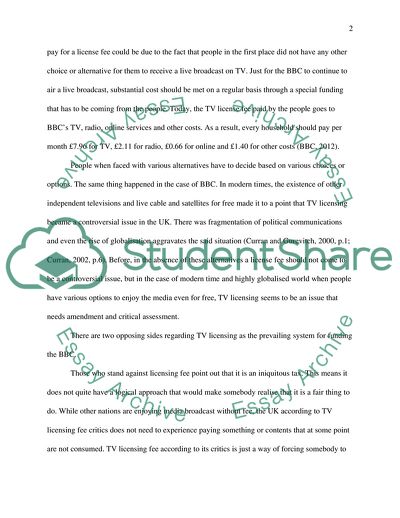Cite this document
(The Case of BBC and TV Licensing Fee Report Example | Topics and Well Written Essays - 3500 words, n.d.)
The Case of BBC and TV Licensing Fee Report Example | Topics and Well Written Essays - 3500 words. https://studentshare.org/journalism-communication/1773537-what-are-the-advantages-and-disadvantages-of-the-current-system-of-funding-the-bbc-why-is-funding-the-bbc-a-matter-of-such-controversy
The Case of BBC and TV Licensing Fee Report Example | Topics and Well Written Essays - 3500 words. https://studentshare.org/journalism-communication/1773537-what-are-the-advantages-and-disadvantages-of-the-current-system-of-funding-the-bbc-why-is-funding-the-bbc-a-matter-of-such-controversy
(The Case of BBC and TV Licensing Fee Report Example | Topics and Well Written Essays - 3500 Words)
The Case of BBC and TV Licensing Fee Report Example | Topics and Well Written Essays - 3500 Words. https://studentshare.org/journalism-communication/1773537-what-are-the-advantages-and-disadvantages-of-the-current-system-of-funding-the-bbc-why-is-funding-the-bbc-a-matter-of-such-controversy.
The Case of BBC and TV Licensing Fee Report Example | Topics and Well Written Essays - 3500 Words. https://studentshare.org/journalism-communication/1773537-what-are-the-advantages-and-disadvantages-of-the-current-system-of-funding-the-bbc-why-is-funding-the-bbc-a-matter-of-such-controversy.
“The Case of BBC and TV Licensing Fee Report Example | Topics and Well Written Essays - 3500 Words”. https://studentshare.org/journalism-communication/1773537-what-are-the-advantages-and-disadvantages-of-the-current-system-of-funding-the-bbc-why-is-funding-the-bbc-a-matter-of-such-controversy.


